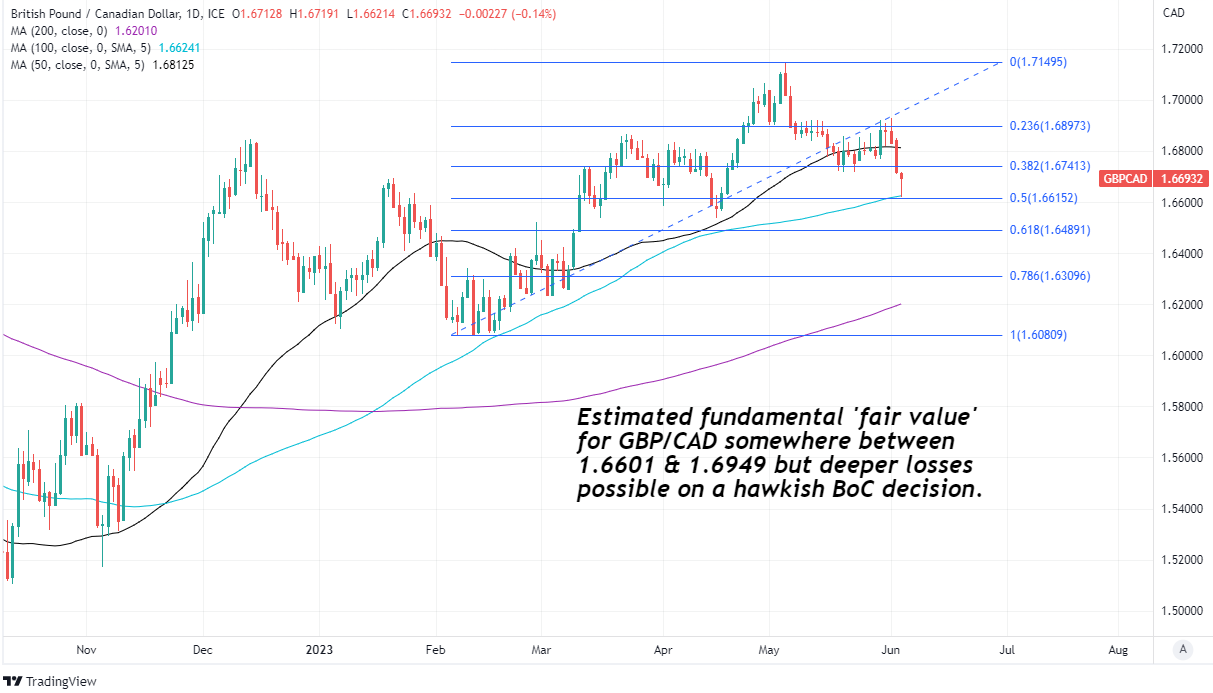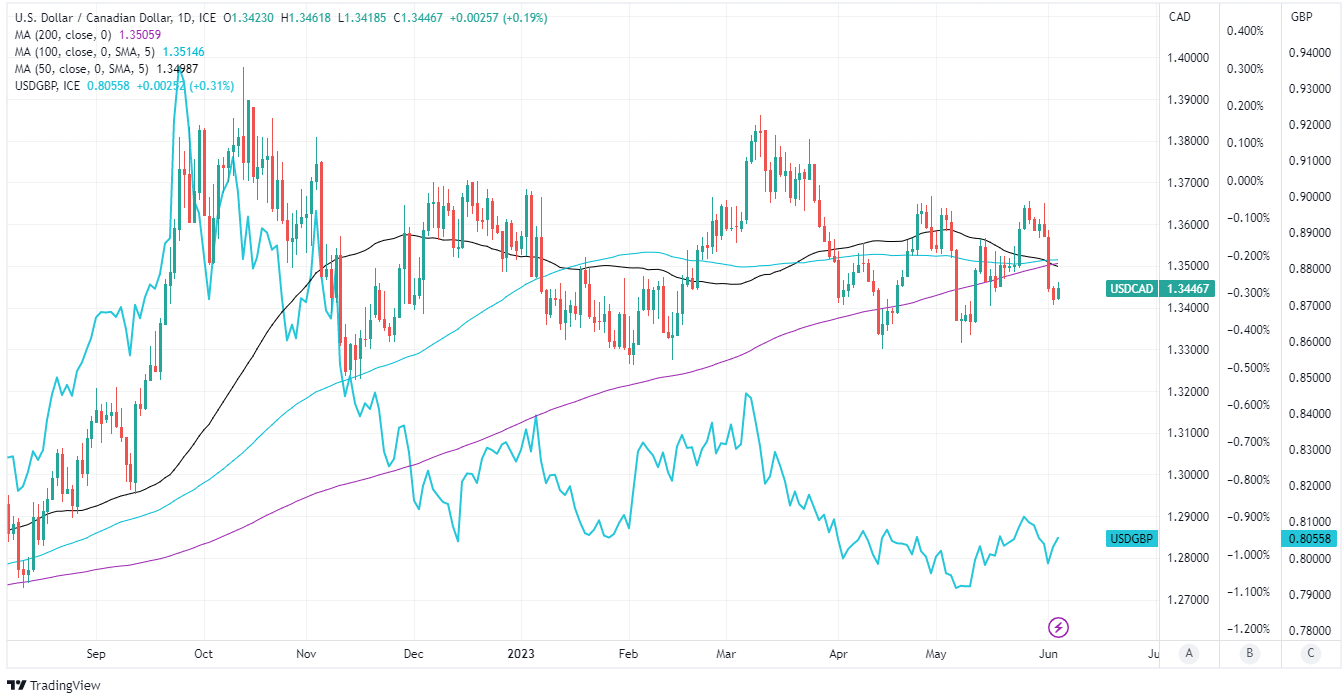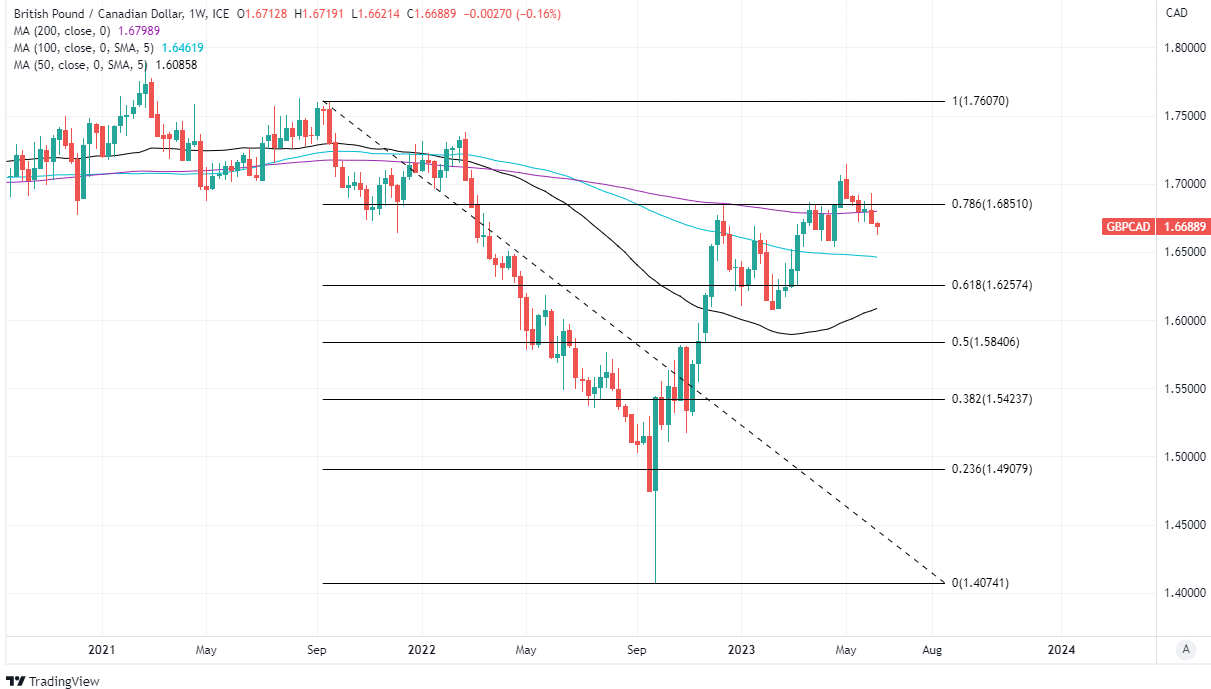GBP/CAD Week Ahead Forecast: Recovering if BoC Waits to See
- GBP/CAD at six-week low ahead of BoC decision
- Supported at 1.6615 & 1.6489, 1.6461 short-term
- Scope to recover losses if BoC opts to wait & see
- Losses beneath 1.65 possible if BoC raises again

The Bank of Canada, Ottawa. Image reproduced under CC licensing condition
The Pound to Canadian Dollar exchange rate fell to its lowest since the middle of April early in the new week but could recover its losses if the Bank of Canada (BoC) elects to wait and see about the evolution of the local economy rather than to begin raising its cash rate again this Wednesday.
Sterling was sold broadly resulting in losses against almost all counterparts in the G20 basket on Monday when the only currencies to sustain widerspread losses were the Swedish Krona and the Turkish Lira while GBP/CAD fell to six-week lows before paring losses.
Canada's Dollar, meanwhile, slipped down through the rankings shortly after the North American open when the Institute for Supply Management (ISM) cited falling employment and sluggish demand as among the factors driving an abrupt slowdown in the U.S. economy's largest sector last month.
Monday's fall took the ISM Services PMI back to levels that are typically indicative of a looming recession and was just one more reason why the BoC might prefer to leave its cash rate unchanged at 4.5% this Wednesday rather than resume the monetary tightening cycle it paused in January.
"We’re looking for the Bank of Canada to maintain its overnight target at 4.5% on Wednesday. Recent data has hardly been reassuring, but we still believe a modicum of patience is needed/warranted," says Taylor Schleich, a director of economics and strategy at NBF Financial Markets.
Above: Pound to Canadian Dollar rate shown at daily intervals with Fibonacci retracements of March 2023 recovery indicating possible areas of technical support for Sterling.
The BoC raised its cash rate to 4.5% in January but also announced that it would then leave the benchmark unchanged while it observed whether the 425 basis point increase from March 2022 is placing enough restraint on the economy to ensure inflation eventually returns to the 2% target.
Governor Tiff Macklem and colleagues flagged that an accumulation of evidence would be necessary to support any judgment but it's debatable whether Canadian economic data has made a clear-cut case since then for a decision one way or the other this Wednesday.
"Macklem has warned they considered a hike in April and we’ve since taken down more hawkish developments at home and abroad (eg. debt ceiling, regional banks). He has warned they are concerned about the next leg down to 2% being a tougher battle," says Derek Holt, chief economist at Scotiabank.
"In my view, the greatest risk to the economy, to inflation, and to the stability of the financial system would be a BoC that turned a blind eye to these developments instead of hiking this week and teeing up a bias toward another," Holt writes in a Friday research briefing.
Canadian lenders are divided in forecasts about the likely outcome on Wednesday, leaving much to be determined by what the BoC Governing Council makes of recent inflation numbers, last week's GDP data, developments in the housing market and a recent uptick in unemployment.
Above: USD/CAD shown at daily intervals alongside USD/GBP. Click for closer inspection.
Canadian inflation ticked higher in an April interruption of its multi-month downtrend while GDP data released last week suggested a stronger first-quarter and April economy than the BoC bargained for in its latest forecasts.
"Ongoing economic resilience will lengthen the path back to 2.0% inflation and as such, we believe the BoC needs to tighten further," writes Mark McCormick, global head of FX strategy at TD Securities, in a Friday research briefing.
"With the market only pricing in around 30bp of hikes by September, a double-whammy of back-to-back hikes should reinforce the move lower in USDCAD. An initial target would be the recent lows of 1.33," he adds.
Hhousing construction activity also rebounded strongly during the opening half of the year in what some economists say was a favourable development for the overall economic outlook and an added source of inflation risk.
But April's job figures revealed a decline in full-time employment for that month and a 100k increase in the number of individuals who'd been unemployed for 13 weeks or less, which might be of particular interest to the BoC.
Above: Pound to Canadian Dollar rate shown at weekly intervals with Fibonacci retracements of September 2021 downtrend indicating possible areas of technical resistance while selected moving averages denote prospective support and/or resistance. Click for closer inspection.
The 'tight' labour market has been a primary driver of BoC concerns about the inflation outlook due to the effect it can have on pay growth and the price-setting intentions of companies but the recent rise in joblessness potentially reflects the effect of earlier increases in the cash rate.
To the extent that it does, there might be a risk of overkill and unnecessary damage to the economy resulting from any Wednesday resumption of the interest rate tightening cycle, although employment figures for the May month could offer clarity about this on Friday.
Meanwhile, prices in interest rate derivative markets indicate investors see around a 50% probability of the BoC raising the cash rate this week, meaning the Canadian Dollar and GBP/CAD are likely to be sensitive to the outcome one way or the other.
"The 425 basis points worth of BoC rate hikes since March 2022 will ultimately take a broader toll in the form of higher unemployment and lower GDP—even if it’s taking longer than previously thought. But with inflation still running hot, the BoC won’t be able to wait too long if recent positive momentum persists," says Nathan Janzen, assistant chief economist at Royal Bank of Canada.
"Two additional employment reports, one more inflation report, and the always closely-watched Business Outlook Survey will all be released in between policy decisions in June and July. Further signs that higher interest rates aren’t slowing the economy as expected would tip the scales towards a hike in July, even if the BoC opts to stick with its pause next week," Janzen adds.



